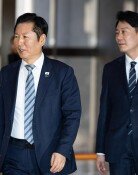[Editorial] Financial Instability Depends on Govt Confidence
[Editorial] Financial Instability Depends on Govt Confidence
Posted March. 18, 2008 03:03,
Fears stemming from the U.S. financial markets have been jolting the global community. The U.S. dollar fell to its lowest level against most major currencies yesterday. However, the dollar has continued to rise against the won in Korea, rising 31.9 won over the weekend to finish at 1,029 won to the dollar on Monday. The continued tumbling of stock prices pushed down the benchmark KOSPI to 1,574.44. Unfortunately, the financial chaos is not likely to end soon.
Analysts attributed the soaring of the won-dollar exchange rate to a massive stock sell-off by U.S. investors, which resulted in the massive drop in stock prices and the strong dollar. However, the Lee Myung-bak administration, which was sworn in only three weeks ago, should look back upon on whether the jitters originated from its poor management of the economy, which led to the lack of investor confidence at home and abroad.
The incumbent government succeeded in winning the ticket to Cheong Wa Dae on the back of public support, with its campaign slogan to revive the economy. Since then, however, it has been busy making excuses, blaming the people for placing too much expectation. Lees government may attempt to accuse the former administration and external conditions of the economic instability at the moment. But, it should remember that chances are it will soon find itself sizzling for its economic leadership and policy management.
No other country is free from the impact from major financial markets, such as the U.S. and China, when they are having hard time dealing with some financial hardships. However, how much shock a nation can deal with depends on the governments ability to provide efficient economic policies. First of all, government officials should show their sincerity and responsibility in handing the issue.
A nations government can earn investors trust at home and abroad only when its high-ranking officials send a reliable signal on behalf of the government and willingly take responsibility for their behaviors. Just engaging in a desk theory over issues such as the exchange rate policy or independency of the central bank, cannot stabilize market uncertainty, if not inviting more harm. In this regard, the determination and competence of the Ministry of Planning and Finance are being tested.
Although the nations financial market has been engulfed in unease and anxiety amid the global financial crisis, the Finance Committee is yet to finish its moving. The committee was allocated to the government building of the former Ministry of Planning and Budget. But it still remains at the building of the Financial Supervisory Service in Yeouido due to incomplete construction. It is said that a number of bureau chiefs have yet to be assigned to new posts.
Investors may feel more nervous to see the main ministry waste its energy and time even when the market situation is changing every moment. The government should show their commitment to saving the economy through action. It should provide more convincing plans on how to regain public confidence and investors trust.







